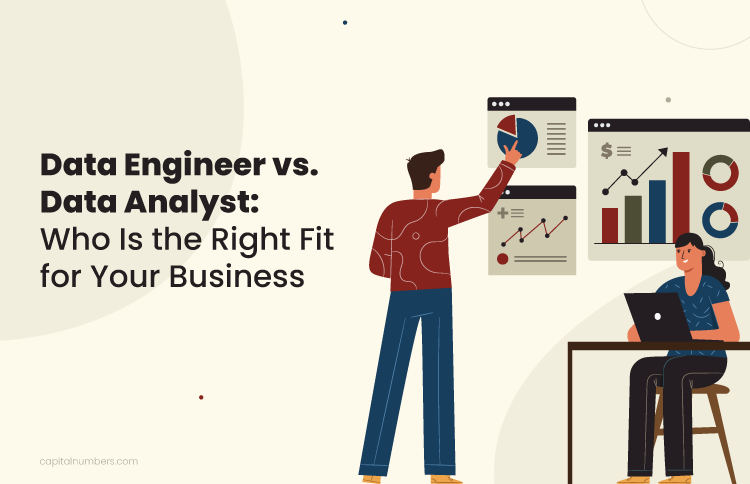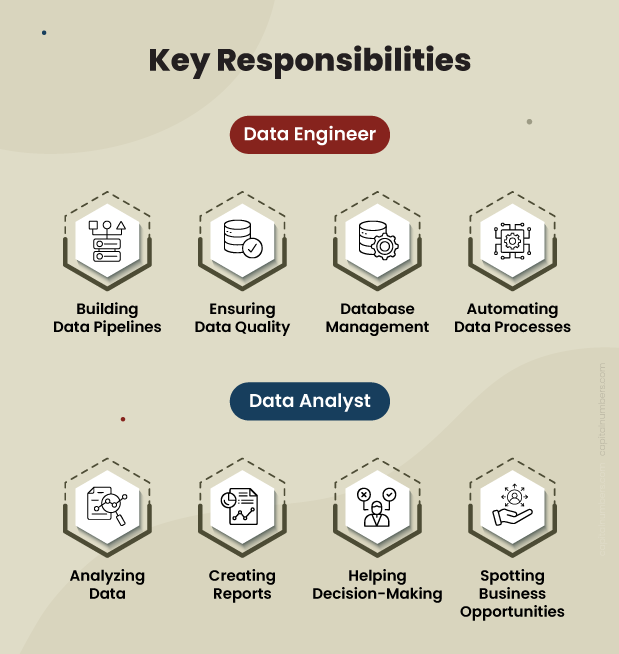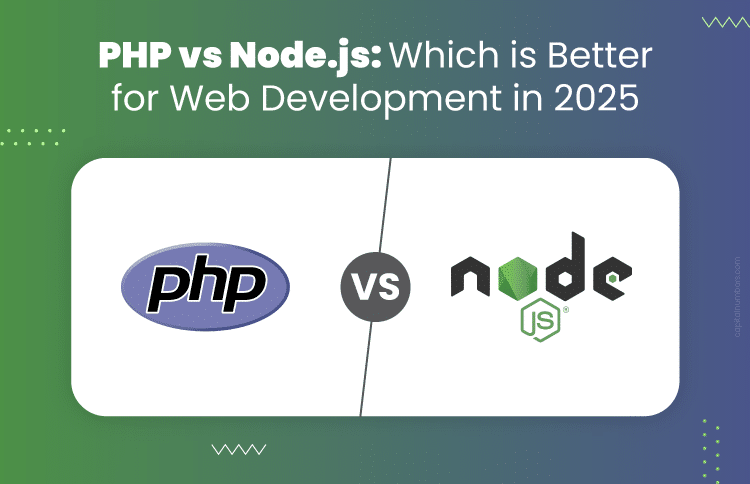Data Engineer vs. Data Analyst: Who Is the Right Fit for Your Business?
Table of Contents
In today’s digital world, data is more important than ever for businesses. It helps companies make smarter decisions, understand customers better, and improve overall efficiency. Whether it’s tracking sales, predicting future trends, or improving operations, data plays a crucial role in staying competitive.
However, handling and making sense of data isn’t always easy. Many business owners find themselves asking: “Should I hire a Data Engineer or a Data Analyst?” Both roles are important, but they serve different purposes. A Data Engineer focuses on building the systems that store and organize data, while a Data Analyst focuses on using that data to generate valuable insights for business growth.
This blog will help you, as a business owner, understand the key differences between these roles. By the end, you’ll have a clear idea of which one your business needs most and how they can contribute to your success.
Who is a Data Engineer?
A Data Engineer is like an architect who builds and maintains the foundation for handling data in a company. Their job is to create systems that collect, store, and organize large amounts of data so that it can be easily accessed and used by others, such as data analysts.
Key Responsibilities of a Data Engineer
- Building Data Pipelines: They design and develop systems that move data from different sources (e.g., websites, apps, customer databases) to a central location where it can be processed and analyzed.
- Ensuring Data Quality: They clean and organize raw data, making sure it’s accurate and ready for analysis.
- Database Management: They set up and maintain databases to store large volumes of information efficiently.
- Automating Data Processes: They create workflows that automatically collect and update data without manual effort.
Task list of a Data Engineer
Some typical work done by data engineers includes:
- Setting up ETL (Extract, Transform, Load) processes to collect and process data.
- Managing and optimizing storage solutions like cloud databases.
- Ensuring data security and compliance with regulations.
Tools and Technologies Used by Data Engineers
Data engineers commonly work with:
- Databases: SQL (for structured data), NoSQL (for flexible data storage)
- Big Data Tools: Hadoop, Apache Spark (for processing large data sets)
- Cloud Platforms: AWS, Azure, Google Cloud (for storing and managing data)
In short, data engineers make sure that the right data is available in the right place, in the right format, and at the right time.
Who is a Data Analyst?
A Data Analyst is like a detective who examines data to uncover useful insights and trends that can help a business make better decisions. They take the organized data provided by data engineers and analyze it to answer business questions.
Key Responsibilities of a Data Analyst
- Analyzing Data: They study patterns and trends in customer behavior, sales, and operations to provide valuable insights.
- Creating Reports and Dashboards: They present findings through charts, graphs, and reports that are easy to understand.
- Helping Decision-Making: They work with different departments (like marketing or finance) to offer data-backed recommendations.
- Spotting Business Opportunities: They identify areas where the business can improve or grow based on data insights.
Task list of a Data Analyst
Some typical work done by data analysts includes:
- Analyzing sales figures to identify the most popular products.
- Creating dashboards to track business performance.
- Predicting future trends based on past data.
Tools and Technologies Used by Data Analysts
Data analysts commonly work with:
- Spreadsheet Software: Excel (for calculations and basic analysis)
- Data Visualization Tools: Power BI, Tableau (for creating charts and reports)
- Databases: SQL (for querying data)
In short, data analysts turn raw data into meaningful insights that help business owners make informed decisions.
Should You Hire a Data Engineer or Data Analyst?
Choosing between a Data Engineer and a Data Analyst depends on your business needs. Think of it like this—do you need to set up a solid foundation for handling data, or do you need someone to analyze and make sense of the data you already have? Let’s break it down in simple terms.
When to Hire a Data Engineer
You should consider hiring a Data Engineer when:
- Your business needs to build or expand data infrastructure.
- If your company is collecting a lot of data but doesn’t have a proper system in place to store, process, and manage it efficiently, a data engineer can help set this up.
- You are dealing with large datasets from multiple sources.
- Businesses that gather data from websites, mobile apps, customer interactions, and sales need a system to merge and organize it all in one place. A data engineer ensures everything flows smoothly and securely.
- You need automation to handle data pipelines and optimize storage.
- If you want data to be collected, cleaned, and stored automatically without manual effort, a data engineer can build automation systems that save time and reduce errors.
Examples of businesses that benefit from hiring a Data Engineer:
- E-commerce: Managing data from website visits, product sales, and customer interactions.
- Fintech (Financial Technology): Handling complex financial transactions and ensuring regulatory compliance.
- Healthcare: Managing patient records, appointment data, and medical research information securely and efficiently.
Hire a Data Engineer if your focus is on setting up or improving the way data is collected, stored, and processed in your business.
When to Hire a Data Analyst
You should consider hiring a Data Analyst when:
- Your business needs meaningful insights from existing data.
- If you have data available but struggle to understand what it’s telling you, a data analyst can examine it and provide useful insights that guide your business decisions.
- Reports and visualizations are crucial for daily operations.
- If your team relies on regular reports and dashboards to track performance, a data analyst can create easy-to-read charts and graphs to help you monitor progress and spot issues.
- You want to identify trends and improve decision-making.
- If you’re looking to understand customer preferences, sales patterns, or market trends, a data analyst can analyze past data to predict future outcomes and help you make smarter choices.
Examples of businesses that benefit from hiring a Data Analyst:
- Retail: Tracking sales trends, customer preferences, and inventory management.
- Marketing Agencies: Analyzing campaign performance and understanding audience behavior.
- Service-Based Industries: Evaluating customer feedback and operational efficiency to improve service delivery.
Hire a Data Analyst if your focus is on using your data to make informed business decisions and track performance effectively.
Do You Need Both a Data Engineer and a Data Analyst?
In many businesses, hiring both a Data Engineer and a Data Analyst can provide the best results. They have different skills but work together to help your business get the most value from its data. Together, they create a complete data-driven strategy by ensuring:
- Data is well-organized and accessible (handled by Data Engineers).
- Data is analyzed to uncover trends and insights (handled by Data Analysts).
You May Also Read: Mastering the Art of Data Storytelling: A Complete Guide
Conclusion
Choosing between a data engineer and a data analyst depends on your business needs. If your goal is to build and manage data pipelines, store large amounts of data, and ensure smooth data flow, a data engineer is the right choice. On the other hand, if you need to analyze data, generate insights, and support business decisions, a data analyst is a better fit.
Evaluate your current challenges and future goals to decide which role best suits your organization. Whether you need a data engineer, a data analyst, or both, investing in data expertise will help your business make smarter decisions and stay competitive in today’s data-driven world.
Struggling to Manage Your Data Efficiently?
At Capital Numbers, we provide top-notch Data Engineering Services to help you organize, process, and analyze your data effectively. Our expert team builds robust data pipelines, optimizes storage solutions, and ensures seamless data flow across your organization. Get in touch today to explore how our data engineering solutions can drive smarter decisions and business growth.
















